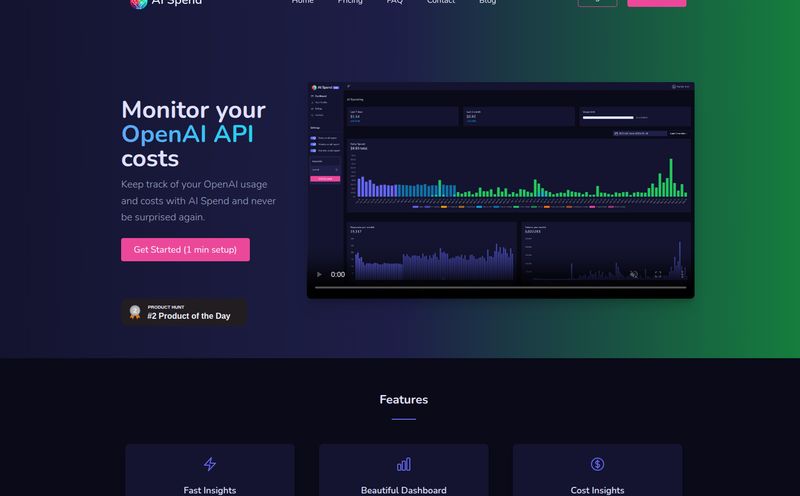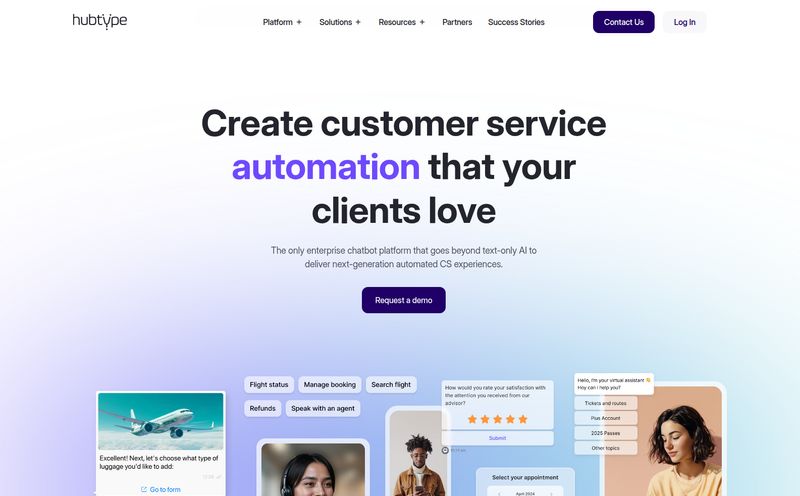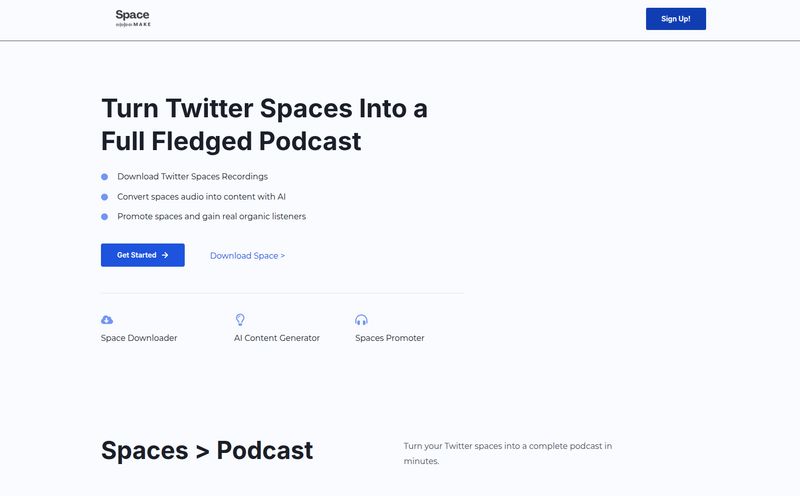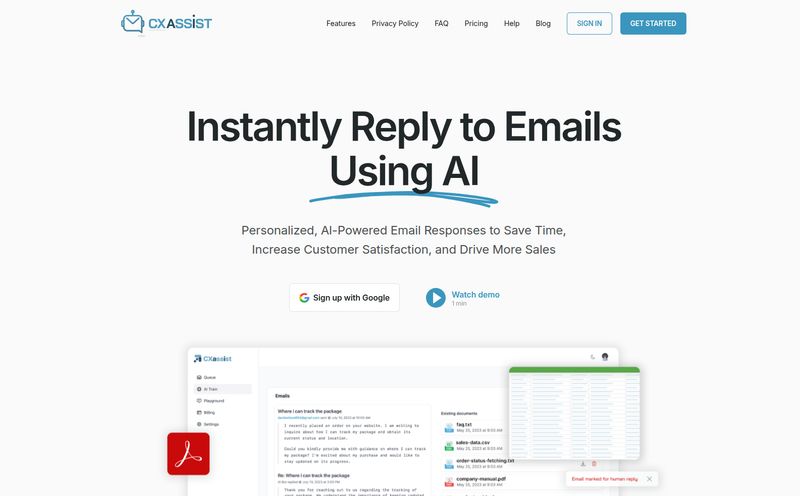If you've ever launched or managed an app, you know the feeling. That little thrill of seeing new reviews pop up, followed by the slow-dawning dread of actually having to read them. All of them. It’s a digital avalanche of five-star praise, one-star rants, bizarre feature requests, and bug reports written in what can only be described as frantic, emoji-laden code.
For years, I've watched clients and fellow marketers drown in this sea of user feedback. We'd task junior team members, bless their hearts, with creating spreadsheets to manually categorize comments. It was a soul-crushing, time-consuming mess. You're basically panning for gold in a river of digital mud. So when a tool like Recensia slides across my desk, promising to use AI to do the heavy lifting, my ears perk up. Is it another overhyped SaaS solution or actually something useful? I had to find out.
So, What Exactly is Recensia?
In the simplest terms, Recensia is like a translator. But instead of translating Spanish to English, it translates the chaotic language of user reviews into clear, actionable insights. It hooks into the Apple App Store and Google Play Store, pulls in all your reviews, and uses its AI brain—specifically natural language processing (NLP)—to tell you what people are really saying.
Instead of you spending hours, or even days, reading every single comment, Recensia gives you the executive summary in seconds. It spots trends, identifies common bugs, and highlights the features your users are begging for. It’s designed to hand your time back to you, so you can focus on building a better app instead of just reading about how broken the current one is.
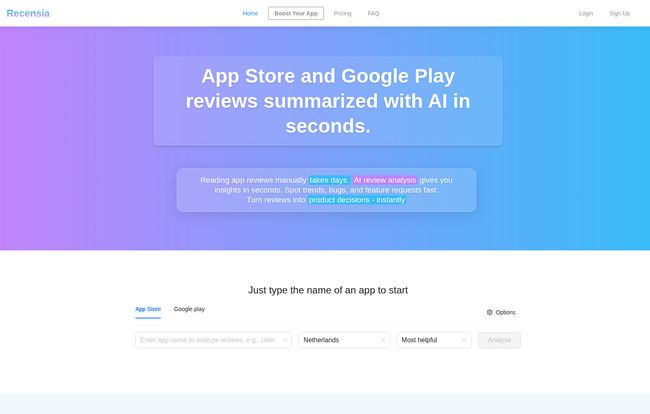
Visit Recensia
The Soul-Crushing Problem of Manual Review Analysis
I once worked with a gaming app that got featured on the App Store. Amazing, right? Well, yes and no. The downloads went through the roof, but so did the reviews. We went from a manageable 50 reviews a day to over 2,000. The feedback was a goldmine, but we had no way to mine it efficiently.
The product manager was stressed, the developers were getting conflicting feedback, and marketing didn't know which positive points to lean into. This is the core problem Recensia aims to solve. Manually sifting through that much data is not just slow; it's prone to human error and bias. You might fixate on one really angry review and miss the fact that 100 other people are quietly complaining about a different, more critical bug.
How Recensia Changes the Game
This is where things get interesting. It's not just about saving time; it's about getting a clearer, more objective picture of your user sentiment. It's like having a superpower.
AI-Powered Summaries: Your Personal Review Analyst
The headline feature is, without a doubt, the AI summary. Recensia doesn't just count keywords. It uses NLP to understand context, sarcasm, and intent. It groups similar complaints and praises together. So, instead of reading 50 reviews that all say “the app crashes when I upload a photo,” you get one neat summary: “High volume of reports about crashes during photo uploads.” Instantly, you have a clear, prioritized issue to hand over to your dev team. No spreadsheets, no manual tallying. Just a clean, simple insight.
Spotting Trends Before They Become Catastrophes
One of the hardest things to do manually is spot gradual trends. Is the sentiment around your new update slowly declining? Are more people suddenly mentioning a competitor's app in the reviews? Recensia’s dashboard is built to visualize this stuff. It tracks sentiment over time, so you can see if that tiny bug from last week’s patch is starting to become a major reputation problem. Being proactive here can be the difference between a minor hotfix and a full-blown one-star review-bombing campaign.
One Dashboard for Both Major App Stores
Having to log into Apple's App Store Connect and the Google Play Console separately is a small but persistent annoyance. Recensia brings it all under one roof. This unified view is more than just a convenience; it allows you to compare feedback across platforms. Are iOS users hitting a bug that Android users aren't? Is the feedback on your UI more positive on one platform than the other? These are the kinds of cross-platform insights that are incredibly valuable for shaping a cohesive product strategy.
Turning Insights into Actual Action
Data is useless if it just sits in a dashboard. Recensia seems to get this. The platform makes it easy to export its findings. You can pull out key summaries and data points to drop straight into a presentation, a Jira ticket, or your product roadmap. This closes the loop between user feedback and development, making sure the voice of the customer actually leads to tangible improvements in the app.
My Honest Take: The Good and The...Well, The Realistic
No tool is perfect, and I always approach AI-driven platforms with a healthy dose of skepticism. After playing around with Recensia, here’s my straightforward take.
The speed is genuinely impressive. What would take hours of manual labor is done in literally minutes. For any team that's stretched thin (and let's be honest, who isn't?), this is a huge win. The ability to quickly identify common issues and feature requests is a massive advantage. It helps you prioritize your work based on what users actually want, not just what the loudest person in the room thinks they want.
On the flip side, you have to be realistic about the AI. While NLP has come a long way, it can still miss subtle nuance, sarcasm, or highly specific technical jargon. I wouldn’t fire your UX research team just yet. It's best seen as a powerful first-pass filter, not a complete replacement for human understanding. Also, its effectiveness is obviously tied to your volume of reviews. If your app only gets 10 reviews a month, you probably don't need a sophisticated AI to analyze them. But for apps with hundreds or thousands of reviews, it moves from a 'nice-to-have' to something pretty essential.
What's the Damage? A Look at Pricing
Okay, the big question: how much does it cost? When I went to check out their pricing page, it was a bit... sparse. It mentions “Choose the package right for you,” which signals a tiered subscription model, likely based on the number of apps you manage or the volume of reviews you analyze. This is pretty standard for a B2B SaaS tool.
Because the specific pricing tiers weren't listed, I can't give you a hard number. My advice? Head over to their site directly to see the latest info. I'd expect different packages for indie devs, small businesses, and larger enterprises.
So, Who Is Recensia Really For?
I see a few groups getting a ton of value out of this:
- Product Managers: To get a quick, data-backed pulse on user sentiment and prioritize the feature backlog.
- Indie Developers: To save precious time and compete with larger teams by responding to user feedback faster.
- UX Designers & Researchers: As a starting point for identifying pain points that require deeper qualitative investigation.
- Marketing & Support Teams: To understand the main drivers of positive and negative reviews and craft better messaging and support docs.
Final Thoughts: Is Recensia Worth It?
In the crowded world of marketing and product tools, Recensia stands out by tackling a very specific, very real pain point. The endless firehose of app reviews is a problem that only gets bigger with success. Automating the initial analysis isn’t just a time-saver; it’s a strategic advantage.
It allows you to be more responsive, build a better product, and keep your finger on the pulse of your user base without driving yourself crazy. While the AI isn't infallible, it's a powerful ally. If you're tired of drowning in reviews, Recensia is definately worth a look. It might just be the life raft you've been looking for.
Frequently Asked Questions about Recensia
- 1. What is Recensia in a nutshell?
- Recensia is an AI-powered tool that automatically analyzes reviews for your apps from the Apple App Store and Google Play. It summarizes feedback, identifies trends, and helps you understand user sentiment quickly.
- 2. Does it work for both iOS and Android apps?
- Yes, it aggregates reviews from both the Google Play Store and the Apple App Store, giving you a unified view of your user feedback across both major platforms.
- 3. Is Recensia a free tool?
- Based on its website, it appears to be a premium service with different packages. For the most accurate and current pricing, it's best to visit the Recensia website directly as this information can change.
- 4. How does the AI summary feature work?
- It uses a technology called Natural Language Processing (NLP). This allows the AI to understand the context and meaning behind the words in the reviews, not just count keywords. It can then group similar themes, like bug reports or feature requests, into concise summaries.
- 5. Can I use the insights from Recensia in my reports?
- Absolutely. The platform is designed to allow easy export of its findings, so you can incorporate the data and summaries into product roadmaps, presentations, or internal reports.
- 6. Is it difficult to get started with Recensia?
- From what I've seen, the platform is designed to be very user-friendly. You simply enter the name of your app to start the analysis. The goal is to simplify your workflow, not add another complicated tool to your stack.
